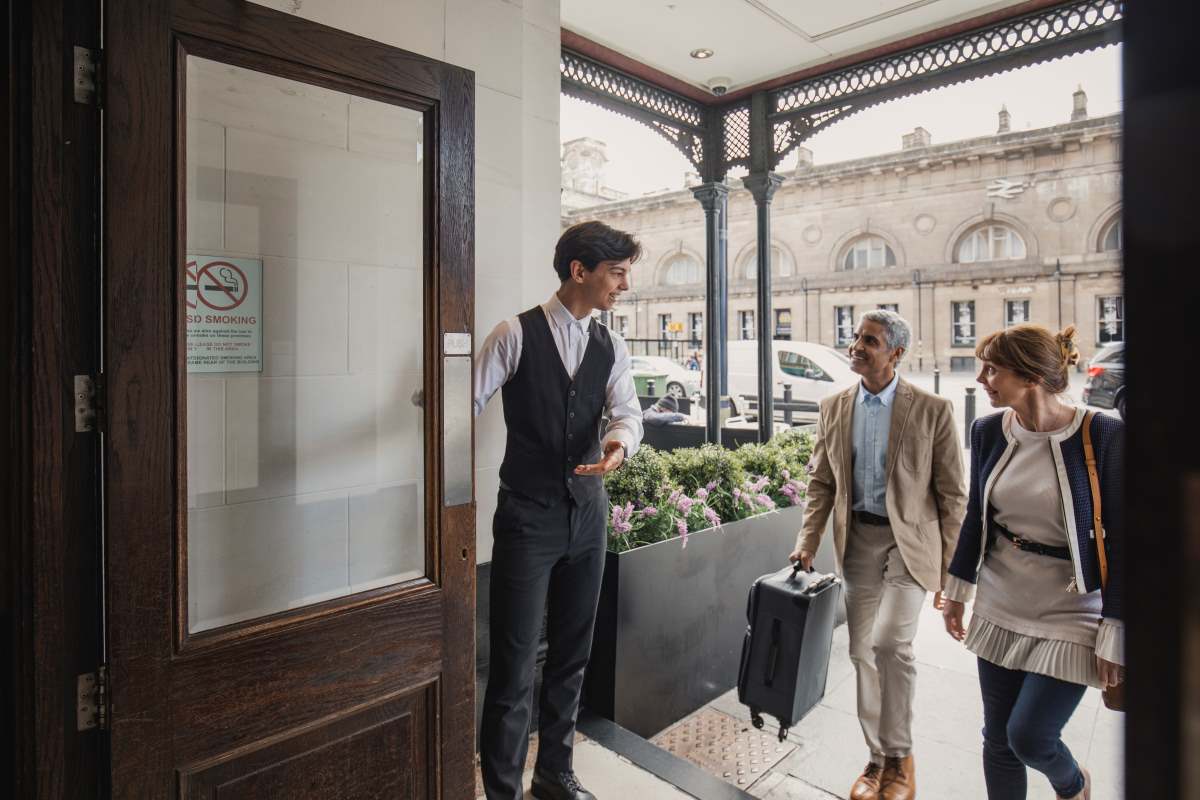The professionals guide to enhancing guest satisfaction
14th June, 2024

In this article

Lets Get Started
Start your journey to Les Roches by downloading our interactive brochure for an indepth look at our school
DownloadAn industry that’s all about personal service and human emotion relies heavily on creating memorable experiences and both meeting and exceeding guest expectations. And in today’s increasingly online world, it’s now more important than ever for hotels. Get it right and you could boost your bottom line but get it wrong and there could be serious consequences.
With many years’ experience as a manager for top brands such as Marriott, Mélia and Starwood Hotels, Rooms Division and Sustainability Lecturer at Les Roches in Marbella Paola Waschbusch has been on the frontline of guest relations throughout her career. She has also spent considerable time as a ‘mystery guest’, assessing hotels’ performance from the customer perspective. As a result, she understands better than most how important guest satisfaction is for the hotel industry and what are the best ways to deliver it.
The importance of guest satisfaction in the hospitality industry
Guest satisfaction is at the core of the hospitality industry. This is a people-to-people business, so all hotels are aiming to have the highest performance in terms of guest satisfaction. Those who consistently achieve high scores are more likely to generate customer loyalty and benefit from word-of-mouth advertising, which ultimately helps them boost their revenue.
I’ve always worked in operational departments and have been a mystery guest, auditor and quality assurance specialist, so I’ve had the pleasure of seeing first hand how properties around the world are striving to achieve this. It’s why they invest so much in trying to provide all the tools and resources their teams need to attain high customer satisfaction levels.
When I started in the hospitality industry more than 20 years ago, the environment was completely different. But today, with social media reviews and all the information available to guests before they even arrive, expectations are now higher than ever. We’re living in such fast-paced times and new trends are emerging all the time, so it’s becoming even more of a challenge for hotels to adapt to changing guest behaviors and preferences. They’re now having to not only meet but also exceed guest expectations. And the pace at which they change means it’s incredibly difficult for hotels to stay aligned with them.
The importance of understanding what guests expect
When looking at how to increase guest satisfaction in hotels, understanding what a guests expectations are is critical. So one of the things hotels almost always ask is the reason for a customer’s stay. That simple clue helps hotels gain a basic understanding of what guest expectations will be. For example, I’m not the same if I’m traveling for business purposes as I am if I’m traveling with my kids. I’m the same guest, but have completely different needs.
All the new systems we have in hotels that allow us to build guest profiles provide crucial information for hoteliers. And if it’s a loyal guest, hotels can build up a very clear picture about their preferences. That data is incredibly helpful because it allows hoteliers to anticipate needs and prepare better for meeting expectations, which in turn helps them create memorable experiences and boost customer loyalty. The resulting higher levels of guest satisfaction can, of course, lead to increased revenue.
A good example of that is cultural awareness. It can help so much when trying to create emotional connections with guests and is something I try to impress upon students here. The more they mix with the many different nationalities here on campus, the easier it will be for them to form those relationships with guests in their future careers.

How a human connection sets you apart from the rest
But it’s not just about the data. I’m a great believer in that human connection and how emotions help create those connections with guests. From my perspective, that’s the way hotels can really set themselves apart from others, create customer loyalty and drive increased revenue.
Paola Waschbusch, Les Roches Lecturer
How to meet and exceed expectations to achieve higher satisfaction levels
One of the great ways of meeting and exceeding guest expectations and therefore achieving higher customer satisfaction levels is through providing a personalized service.
That’s why hotels focus on personalizing service, using the valuable customer information they have gained through previous interactions, purchase history and other personalization techniques to deliver exceptional guest experiences. There’s also a great opportunity to up-sell and generate more revenue by tailoring guest experiences. Because the more you get to know your guest, the more you can offer things for which they really are willing to pay a premium.
It’s almost a virtuous circle too, because those improved financial results will give you the funds you need to create good training programs for employees, which helps ensure they are equipped to deliver those memorable experiences to guests.
Creating a memorable experience
Hotels can use many different techniques for creating a memorable experience for guests by personalizing their stay, including leaving welcoming gifts in their rooms or offering complimentary refreshments. Often they are just little things that don’t cost much but can create a lasting impression.
But in my personal experience, I do not remember how luxurious the hotel was or the specific services offered. I remember people. Yes, the personalization techniques are important, but at the end of the day, what really creates that customer loyalty are those human connections. So of course, hotels need to deliver a consistent high-quality product and services adapted to the guests’ requests. But at the end of the day, what enables them to create those memories is actually employee engagement.
For management, it becomes a question of caring for employees and guests at the same time. If you create that ‘hospitality mindset’ as the general manager, you will be co-creating those special memories. Of course, you can build guest profiles from all the advanced technology you have at your disposal. But sometimes you find out how you can make a stay truly memorable through just a small guest-employee interaction. That’s why having employees who are engaged is so important.
There is a nice Japanese concept called Kuuki Yomenai that I love because it refers to reading the ambiance and having the sensitivity to notice, for example, if a guest wants to talk or not. Once you start being aware of a customer’s feelings, you can really make a difference.
It would be amazing to create ‘wow’ experiences every time we have an interaction with guests. But in real life, that’s not possible, even in the most luxurious hotels in the world. But if you foster that guest-oriented culture in which employees are engaged, at some point in what we call the ‘guest cycle’, there should be moments when you can create that emotional connection.
It’s all about teamwork
Teamwork is crucial to creating memorable guest experiences. Sometimes the key information that enables you to deliver personalized experiences will come from one department and the memorable gestures are delivered by another. That’s why Paola calls it “co-creation”, because really you need to work as a team.
Learn more about creating unforgettable hospitality experiences

Hospitality Careers
Exploring the world of guest services: from definitions to job descriptions

Industry News

Industry News
Improve your career prospects with online learning
Learn from the very best on topics ranging from sustainable hospitality to financial analysis. All courses are self-paced with on-demand learning to suit the busiest lifestyles.
Les Roches online learning
The key to making a stay more memorable
When it comes to delivering more memorable guest experiences, as I’ve said before, I believe employee satisfaction is critical. If you’re happy where you are working and if you know you have support no matter what situation and are empowered, that will help you meet and exceed guest expectations.
The industry is facing many challenges at the moment and high employee turnover rates mean it’s difficult to retain the kind of talent you need to deliver memorable experiences. So from my point of view, conscious leadership that’s committed to employee engagement is what hotels need to meet those challenges.
This is a people-to-people business and we should focus on employees who are the real stars of creating memorable experiences for guests. If employees are being the best version of themselves, they will enable hotels to attain the guest satisfaction levels they need. So they need to be given the support, the tools and the feedback that will enable them to shine.

Making use of feedback
Of course, as the saying goes, if you don’t measure something, you can’t improve it, so it’s critical for hotels to gather feedback from guests about their stays as well. This not only helps them gauge the effectiveness of their internal processes, it also helps when it comes to personalizing potential the interactions you may have with guests in future.
Asking for feedback can be great for generating positive reviews that can lead to increased bookings, but it can be dangerous too. For example, if you have a survey sample of 50 people and just two guests mention the buffet offer is not up to their expectations, of course you need to follow it up, but it’s not something that means you need to completely change your strategy.
Another thing hoteliers should consider is that complaints are also an opportunity to ultimately exceed guest expectations. If a guest is taking the time to ask to speak to a manager, it’s because they really want to share what happened to them. That means you can gather information that’s useful for improving service in future and maybe turn things around for the guest at the same time. It’s also a chance to forge a connection, solve a problem and make the guest feel you have listened to them and care what they think.
I’m still in contact with some guests who made complaints to me in the past. They still send me messages, so despite the situation, they knew I was willing to help and try to solve their problem.
Remember to use your team meetings wisely…
Many guests do not even complete a survey or take the time to post a review. So hotels should base their strategies not only on the feedback they get through surveys and questionnaires but also on what guests tell employees. The people who work in the hotel receive in-person feedback daily, so team meetings can be highly relevant if you want to find out what guests are really thinking.
How to create and maintain brand loyalty to deliver on guest expectations
Many of the larger hotel brands have different tiers designed to appeal to specific audiences and so align with their particular expectations. During my time with Westin – part of Marriott International – I was part of a program looking at how to connect its brand promise with real life across all our different programs and offers.
One of these was the value of ‘wellbeing’ and involved a range of initiatives such as ‘sleep well’, in which we provided lavender essential oils and different pillows depending on guests preferences. Hotels have genuine opportunities to customize their offer to align with certain guest expectations and people for whom those values are important will tend to gravitate towards such brands.
Creating a brand identity and delivering on that brand promise helps you provide the kind of experience guests are expecting, which in turn helps boost your guest satisfaction levels if you are genuinely delivering on them.
Not every hotel is able to provide personalized service and that’s mainly due to a lack of resources. But if brands create something specific that is aligned with their guests’ desires and expectations, they can create powerful connection with them.
On the flip side, failing to deliver on those brand promises can create dissatisfaction, though again, that may provide you with the opportunity to put things right. For example, in my last property, we had challenges with guest satisfaction among our top tier loyalty program members. They put a lot of business our way throughout the year, so whenever they were on holiday, they expected to stay in suites. But in high season, we were not always able to accommodate those expectations.
Again, it came down to small details and trying to recognize their loyalty level with simple extras to make those guests feel important. It didn’t cost much; it was more about making that emotional connection. And at the end of the day, we reached the highest satisfaction scores in the loyalty program for the whole of the EMEA region. It was a question of appreciation and meant more than just sending them a complementary gift or something.
Human needs are always the same – we want to feel appreciated, cared for and that we belong. In this case, as soon as we started making those customers feel that way by recognizing their loyalty, we were able to uplift guest satisfaction to unprecedented levels.



